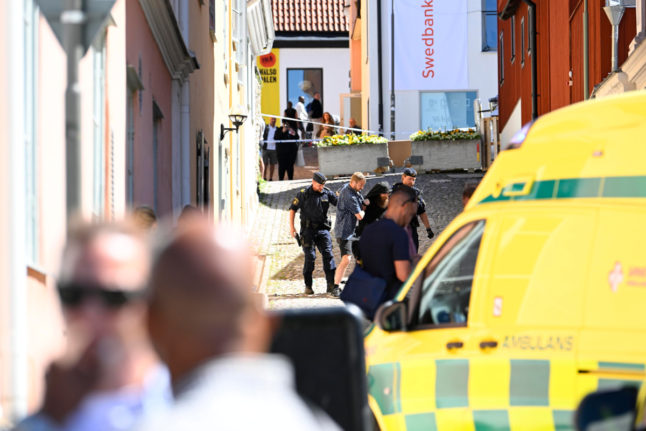It’s been a year since a murder that shook Sweden.
At last year’s Almedalen Week, far-right sympathiser Theodor Engström stabbed leading Swedish psychiatrist Ing-Marie Wieselgren right in the middle of the busy streets of Visby, killing her.
It was revealed that he also had plans to kill Centre Party leader Annie Lööf, who had been set to hold a press conference just a few metres from where Engström was arrested by police.
He was found guilty of murder and preparing to commit an act of terrorism.
Almedalen Week, which this year takes place between June 27th and July 1st, is famous for its openness – it’s visited by thousands of people every year and it’s easy to get access to and speak with some of the country’s most senior decision-makers. Every day, the party leaders take to the stage to give a keynote speech, always broadcast live on television.
INDIANS IN SWEDEN:
There was talk, early on, about increasing security at Almedalen by cordoning off certain areas and introducing security checks. But those suggestions were quickly dismissed, according to organisers.
Police did not ask for such measures, and many businesses and organisations that take part during the week said that Almedalen Week “would not be the same” with security checks and restrictions.
It would also be difficult to cordon off any areas. The festival takes places in several locations all over Visby, a picturesque medieval town with cobblestoned streets, nestled next to the water.
“That’s why our focus has been to, as far as is possible, let Almedalen Week remain a democratic, open meeting place for all,” the festival’s organiser, Mia Stuhre, told Swedish news agency TT.
This year, however, the festival has recruited around 20-30 so-called “Almedalen hosts”. They are meant to be a point of service for visitors, but will also be keeping an extra eye on security – although they will not be a substitute for police officers and their role is not to act as security guards.
“They are trained in watching and reporting if anything seems suspicious. If anyone leaves a bag behind by mistake they can keep an eye on it. They’re an extra pair of eyes and ears,” said Stuhre.
Just like last year, the airspace above Gotland will be closed to private airplanes and drones during Almedalen Week. Commercial flights are still able to take off and land at the airport outside Visby.
Swedish neo-Nazi group NMR has sparked concerns in previous years when they’ve organised rallies in Visby, but TT reports that there are no indications they’re planning anything this year.
Far-right provocateur Rasmus Paludan tried but failed to burn a copy of the Quran at last year’s festival, but there is at the moment nothing to suggest he’s coming to Almedalen Week this year either.
In other news
Liberal leader Johan Pehrson has suggested that the Euro could be introduced in Sweden without a referendum. In 2003 55.9 percent of Swedes voted no in a referendum about joining the Euro.
“We ought to want to join, with great fire and passion,” Pehrson told Aftonbladet.
Pehrson is the leader of Sweden’s probably most pro-EU party, but it is unlikely that the country will swap its kronor for euros any time soon. The far-right Sweden Democrats, on whose support the current government depends, are against deepening Sweden’s ties with the European Union.
Prime Minister Ulf Kristersson hit out at cars in city centres in a recent interview with Expressen. He told the newspaper that cars symbolise freedom, but that he wanted to limit road traffic in cities.
“Walking freely in a city represents freedom just as much,” he told Expressen, adding that his conservative Moderates were inspired by Munich in Germany, which has pedestrianised several of its streets.
Politics in Sweden is a weekly column looking at the big talking points and issues in Swedish politics. Members of The Local Sweden can sign up to receive an email alert when the column is published. Just click on this “newsletters” option or visit the menu bar.




 Please whitelist us to continue reading.
Please whitelist us to continue reading.
Member comments